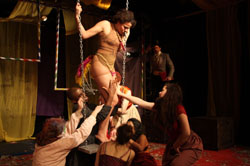Although the Ringling Bros. and Barnum & Bailey Circus arrived in D.C. last week, another sideshow act lurks just beyond Georgetown’s front gates. The set of Venus has transformed Walsh’s Black Box Theatre into the underbelly of a circus’ big tent, outlined by thick, red bands of fabric that drape from ceiling to floor. At center stage dangles a performer’s swing, where Tess Trotter (COL ‘14) plays Saartjie Baartman, or the “Venus Hottentot.”
To reach the circus stage, however, the audience must first pass through a sobering setup chronicling Baartman’s life in a miniature mock-museum. Known as “Venus” by gawking circus goers that demeaned her and a sideshow that exploited her, Baartman came into this identity after leaving South Africa hoping to escape slavery—only to find her freedom taken away once again. Paraded across Europe in a sexual freak show, crowds paid to watch Venus dance and to stare at her “abnormally large” backside.
The Black Theatre Ensemble’s production of Suzan-Lori Parks’ Venus relates this tragic and upsetting story, pointing out hate and hypocrisy at every turn. Helen Rave (COL ‘13) plays several roles, but channels Venus’s core emotions through the play’s most unsympathetic character—the Mother Showman. As the one responsible for exhibiting Baartman as a rare and grotesque oddity to reap a fortune for herself, Rave’s portrayal of the Mother Showman expertly elicits disgust with every line.

This powerfully disdainful character dominates the majority of the first act, which makes the surprising failure of the script to portray Venus’s character as an emotional counterbalance all the more apparent. Sitting on a bed in Paris, playing with her platinum wig, Venus fantasizes about marrying the rich doctor who has taken her in, even as he forces her into abortions and hastily awaits her death so he can measure her bones. In scenes like this one, Venus’s bizarre lack of anguish diminishes the strong feminine image the play claims she represents.
Though Venus addresses a story made even more unsettling by its truth, Parks’ play’s uncomfortable moments hit at the wrong points. In an outlandish scene, doctors—dressed as clowns under their white lab coats—face away and pleasure themselves en masse. These weird and disturbing scenes draw away from the play’s social criticism, making it feel more like a vapid farce. For lengths, BTE’s version of Venus bends to the power of pure spectacle.
The play’s serious underpinning hangs by a tenuous thread, only saved by the Negro Resurrectionist. Played by Jarvis Matthews (COL ‘12), the Resurrectionist serves as the audience’s only connection to the reality behind the dark and grotesque circus act that unfolds on stage. Sitting atop a platform overlooking the stage below, the Resurrectionist provides a calm perspective to a dark and vivid drama. Even in Venus’ most uncomfortable moments, the Resurrectionist looks on calmly, softly reminding the audience that through all the absurdity, Venus tells a true and disturbing chapter in our history. Though elephants and acrobats are sure to delight, at the points that Venus shines, the play provokes a much deeper reflection in its own circus.
Venus runs in the Walsh Black Box Theater from Wednesday, March 30 through Sunday, April 3.



